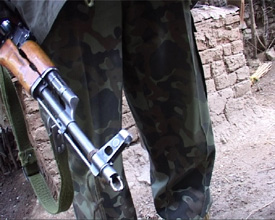Pather Chujaeri
The Play is on
Pankaj Rishi Kumar
Indien 200 |
| |
|
 |
|
|
Arsenal 1
13.02., 17.30
CineStar 8
14.02., 16.30
|
|
|
|
|
Produktion: Rajeev Mehrotra PSBT
Weltvertrieb: Rajeev Mehrotra PSBT
A-8, Nizamuddin (E), New Delhi
Tel.: (91-11) 435 5941
e-mail: psbt@vsnl.com
Kamera, Schnitt: Pankaj Rishi Kumar
Ton: Jagan Shah, Gisy Michael
Format: Video / Beta SP Pal (gedreht auf DV)
Länge: 52 Minuten
Sprachen: hindi, kashmiri |
|
|
|
|
Die Bhands sind Gruppen von Schauspielern, die nicht lesen und
schreiben können und in entlegenen Dörfern der Kaschmir-Region
leben. Sie sind spezialisiert auf eine Art des satirischen
Theaters, auch ‘pather’ genannt, das bekannt ist für seine
Kostüme, seine Musik und seine mystischen Kräfte.
The Play is on… begleitet zwei unterschiedliche Gruppen von
Bhands auf dem Weg zu einem ihrer selten gewordenen öffentlichen
Auftritte. Eine Truppe spielt auf dem Proszenium eines
staatlichen Theaters in Chandigarh, die andere tritt, umringt
von Dorfbewohnern, vor dem Schrein eines angebeteten Sufi-Heiligen
auf. Beide Theatergruppen verkörpern die Zwangslage
der Bhands, die trotz aller sozialen und kulturellen Verschlechterungen
eine Jahrhunderte alte Tradition aufrecht erhalten und
nunmehr aufgrund einer paternalistischen, nationalistisch ausgerichteten
kulturellen Politik ins Abseits geraten.
Auch wenn die Bhands fortwährend von Korruption und Gewalt
in der Kaschmir-Region eingeschüchtert werden, halten sie an
ihrem Engagement für das kritische Theater fest und propagieren
die befreiende Wirkung des Schauspielens. Täglich müssen
sie mit ansehen, wie ihre Art zu leben untergraben wird. Deshalb
betrachten sie jede ihrer Aufführungen als eine Wiederholung
der gleichen brutalen Situation: Man erlaubt ihnen nicht, ihren
revolutionären Geist mit anderen zu teilen. Ihr Sufi-Glaube hat
ihre Leidenschaft für die Satire etwas gemäßigt, so dass
sie sich
heute vor allem für die Freiheit Kaschmirs einsetzen.
|
| |
|
|
The Bhands are a largely illiterate community
of performers scattered in isolated villages
of Kashmir. They perform the “pather“
form of satirical theatre, and are known for
their costumery, music and mystic powers.
Since 1989, when the valley of Kashmir
sank into a long, dark period of violence
and terror, the Bhands have rarely performed
in public.
The Play is on… follows two different
groups of Bhands, as they both set out for
a rare public performance. One group performs
on a proscenium in a state-run theatre
festival in Chandigarh, while the other
performs amid a crowd of villagers at the
shrine of a revered Sufi saint. Both groups
represent the predicament of the Bhand
community, which has sustained a centuries-
old tradition in the face of debilitating
social and cultural changes but now
finds itself marginalised under paternalistic
and nationalistic cultural policies.
Although perennially intimidated by the
corruption and violence that prevail in
Kashmir, the Bhands affirm a commitment
to critical theatre and the liberating joys of
performance. Witnessing daily the erosion
of their way of life, the Bhands see each
performance as a repetition of the same
brutal fact: that they are not free to share
their revolutionary spirit. But faith in
Sufism has tempered their enthusiasm for
satire and today they identify with the collective
voices of Kashmir’s freedom.
|
| |
|
Biographien / Biographies
Pankaj Rishi Kumar, geb. 1967 in Delhi. Studium der Anglistik in Delhi,
später Filmstudium. Von Beruf Cutter. Filmregie: Kumar Talkies (Forum
2000). The Play is on ist sein zweiter Film.
|
